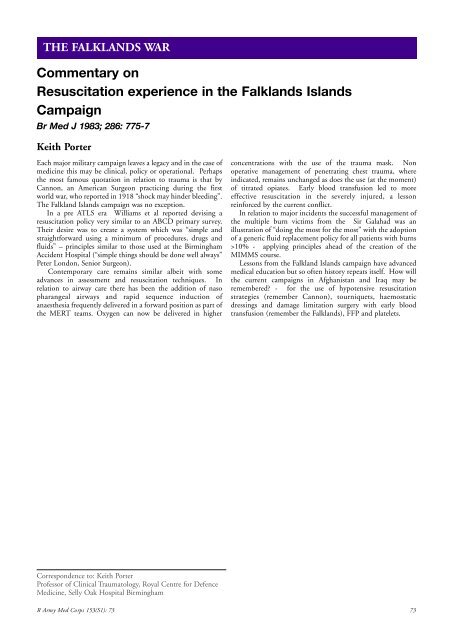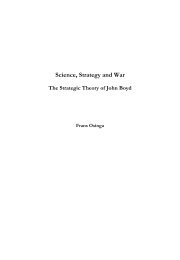Falklands war 25TH anniversarY - Boekje Pienter
Falklands war 25TH anniversarY - Boekje Pienter
Falklands war 25TH anniversarY - Boekje Pienter
You also want an ePaper? Increase the reach of your titles
YUMPU automatically turns print PDFs into web optimized ePapers that Google loves.
THE FALKLANDS WAR<br />
Commentary on<br />
Resuscitation experience in the <strong>Falklands</strong> Islands<br />
Campaign<br />
Br Med J 1983; 286: 775-7<br />
Keith Porter<br />
Each major military campaign leaves a legacy and in the case of<br />
medicine this may be clinical, policy or operational. Perhaps<br />
the most famous quotation in relation to trauma is that by<br />
Cannon, an American Surgeon practicing during the first<br />
world <strong>war</strong>, who reported in 1918 “shock may hinder bleeding”.<br />
The Falkland Islands campaign was no exception.<br />
In a pre ATLS era Williams et al reported devising a<br />
resuscitation policy very similar to an ABCD primary survey.<br />
Their desire was to create a system which was “simple and<br />
straightfor<strong>war</strong>d using a minimum of procedures, drugs and<br />
fluids” – principles similar to those used at the Birmingham<br />
Accident Hospital (“simple things should be done well always”<br />
Peter London, Senior Surgeon).<br />
Contemporary care remains similar albeit with some<br />
advances in assessment and resuscitation techniques. In<br />
relation to airway care there has been the addition of naso<br />
pharangeal airways and rapid sequence induction of<br />
anaesthesia frequently delivered in a for<strong>war</strong>d position as part of<br />
the MERT teams. Oxygen can now be delivered in higher<br />
concentrations with the use of the trauma mask. Non<br />
operative management of penetrating chest trauma, where<br />
indicated, remains unchanged as does the use (at the moment)<br />
of titrated opiates. Early blood transfusion led to more<br />
effective resuscitation in the severely injured, a lesson<br />
reinforced by the current conflict.<br />
In relation to major incidents the successful management of<br />
the multiple burn victims from the Sir Galahad was an<br />
illustration of “doing the most for the most” with the adoption<br />
of a generic fluid replacement policy for all patients with burns<br />
>10% - applying principles ahead of the creation of the<br />
MIMMS course.<br />
Lessons from the Falkland Islands campaign have advanced<br />
medical education but so often history repeats itself. How will<br />
the current campaigns in Afghanistan and Iraq may be<br />
remembered - for the use of hypotensive resuscitation<br />
strategies (remember Cannon), tourniquets, haemostatic<br />
dressings and damage limitation surgery with early blood<br />
transfusion (remember the <strong>Falklands</strong>), FFP and platelets.<br />
Correspondence to: Keith Porter<br />
Professor of Clinical Traumatology, Royal Centre for Defence<br />
Medicine, Selly Oak Hospital Birmingham<br />
R Army Med Corps 153(S1): 73 73

















